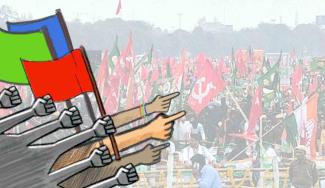
A weakened government back in office and a stronger and more energised opposition to take it on in Parliament. The net outcome of the 2024 elections can perhaps be seen only as a modest pro-opposition tilt in the balance of forces. In a functional democracy it should mean a restrained executive and consequently a restored political equilibrium in society and governance. But parliamentary democracy in India in 2024 is anything but functional. Relentless erosion of democracy has been the new normal in Modi's India since 2014. And it remains so in spite of the shot in the arm delivered by the 2024 mandate.
The Modi government must have had a fair idea of the ground reality while going into the 18th Lok Sabha elections. The prolonged election schedule was presumably to give it maximum possible time to try and minimise its losses by tiring out the resource-starved opposition in an electoral battle that could not have been more unfair and unequal. The regime did everything possible to set the tone for an ambitious and confident campaign which would not reveal any signs of weakness. All the while however it worked hard behind the scenes to firm up alliances, arrange votes and fix the machinery to save its tally from dropping below a certain level.
Without its last-minute alliance with JDU in Bihar, TDP in Andhra Pradesh and RLD in UP, it is not difficult to imagine what the fate of the Modi regime would have been in these elections. The eventual tally of 240 seats for the BJP and 293 for the NDA, including thirty-odd seats won by a narrow margin of less than 40,000 votes, is actually a product of this elaborate micromanagement and interference. But just as the BJP did not reveal any nervousness before the election - except the evident panic and desperation in Modi's speeches and body language immediately after the first phase feedback - its initial moves regarding the new government are also designed to give a 'business as usual' impression.
All erstwhile key ministers in the outgoing cabinet and advisors to the Prime Minister have been retained to indicate continuity without any change. The sanction granted by the Delhi LG to prosecution of Arundhati Roy and Sheikh Showkat Hussain under UAPA in a 14-year-old complaint is meant to tell the whole world that Modi is still in control and fear and persecution shall continue to be his biggest tools of governance.
While the BJP, especially the Modi camp, does not acknowledge any real decline or concern about the growing anger of the people as reflected in the defeat of a sizable number of Modi ministers and huge losses in states like Uttar Pradesh, Maharashtra and Rajasthan, RSS functionaries including Mohan Bhagwat have sounded some cautionary notes. This is perhaps more to maintain the image of the RSS as a collective and disciplined organisation which does not approve of any personality cult than to exercise any real check on the BJP. It also probably reflects the fact that both the RSS and the BJP have of late been trying to reassert their job division within the Sangh Parivar - with Nadda claiming political autonomy for the BJP and RSS reiterating its moral guardianship.
Two decades ago Atal Bihari Vajpayee had famously talked about the need to uphold 'Rajdharma' in Gujarat in the wake of 2002 anti-Muslim carnage and Modi had replied by saying that he was indeed doing that. That was his way of telling everybody that overseeing a carnage was his idea of what kind of 'Rajdharma' should be expected of him. It got him the title of 'Hindu Hriday Samrat' (emperor of Hindu hearts). RSS has benefited immensely from the BJP being in power not just in terms of advancement of its ideological agenda but also in terms of its organisational expansion and it is not likely to do anything to destabilise the BJP's continued stay in power.
True to the Modi government's track record of misgovernance, his third term has begun literally on a disastrous note - with yet another major railway accident and massive scams in the conduct of examinations like NEET and NET. And as always, the government is in denial mode, refusing to take any responsibility for these major policy and governance failures.
Meanwhile, there is a renewed campaign of anti-Muslim violence - from mob lynchings and shop lootings to communal riots and demolitions of homes and places of worship - across India, apparently to teach Muslims a lesson for not voting for the BJP. And there is even a clamour for economic boycott of Ayodhya's 'ungrateful' Hindus who defeated the BJP candidate calling for a new constitution and elected a veteran Dalit leader of the Samajwadi Party from the unreserved seat of Faizabad.
While fascist thuggery and violence escalates on the street with impunity granted by the state, the new set of criminal laws that seek to arm the state with more sweeping and draconian powers in the garb of 'decolonisation' of India's legal architecture, is all set to come into force from the first of July. If Modi 3.0 thus begins on this note of intensified fascist aggression, the opposition must make the fullest use of its increased strength to encircle and challenge the regime both inside Parliament and outside of it through intensified popular protests. It is the alertness and assertion of a united and awakened people that will defeat dictatorship and secure the ultimate victory of democracy.
Charu Bhawan, U-90, Shakarpur, Delhi 110092
Phone: +91-11-42785864 | Fax:+91-11-42785864 | +91 9717274961
E-mail: info@cpiml.org







